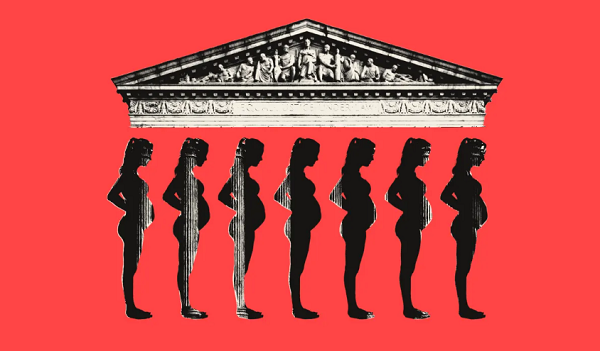Dobbs Has Created a Health Care Apocalypse
By Abby Vesoulis
May 10, 2024
 Dr. Leilah Zahedi-Spung spent four years in medical school, four years in an OB-GYN residency, and three years in a maternal-fetal medicine fellowship learning how to care for high-risk pregnant patients. In her decade-plus of medical training, she learned that in some cases, the only rational and responsible option for medical intervention is an emergency abortion. In July 2021 she moved to Chattanooga, Tennessee, and discovered she was the sole provider in her area trained to perform second-trimester dilatation and evacuation abortions for patients who needed them to survive.
Dr. Leilah Zahedi-Spung spent four years in medical school, four years in an OB-GYN residency, and three years in a maternal-fetal medicine fellowship learning how to care for high-risk pregnant patients. In her decade-plus of medical training, she learned that in some cases, the only rational and responsible option for medical intervention is an emergency abortion. In July 2021 she moved to Chattanooga, Tennessee, and discovered she was the sole provider in her area trained to perform second-trimester dilatation and evacuation abortions for patients who needed them to survive.
But in 2022, the Supreme Court delivered its Dobbs v. Jackson Women’s Health Organization decision, and Tennessee’s trigger ban—written in preparation for the possibility that the Supreme Court would overturn Roe—went into effect a month later. Suddenly, providing an abortion in Tennessee became an immediate Class C felony punishable by up to 15 years in prison. There were no exceptions, even when an abortion was necessary to save a life or prevent serious bodily harm. Only after being arrested could a physician provide something called an “affirmative defense” to fight the charges. (Eight months after the trigger law took effect, the GOP governor signed a bill allowing abortions in limited medical emergencies.)
Given her unique work, which also includes genetic testing and live deliveries, Zahedi-Spung felt as if she wore a bull’s-eye on her back. She hired a criminal defense attorney—just in case—and immediately began looking for a maternal-fetal medicine position out of state. She didn’t want to leave Tennessee at all, she says, but her goal was “to not go to jail.”
Relocating for work isn’t a novel concept, but in the age of unfettered abortion restrictions, there has been an exodus of OB-GYNs from abortion-banned states, and dwindling interest among future OB-GYNs to settle in those states. The result is worsening health outcomes for the vulnerable patients and moms who remain.
“As more clinicians leave those states, as more maternity care deserts happen, we will see poorer outcomes,” says Dr. Stella Dantas, an OB-GYN in Oregon and the president-elect of the American College of Obstetricians and Gynecologists. “And I do think we will see more maternal mortality just by the sheer fact that we won’t have providers even trained to take care of some of these obstetric emergencies.” Indeed, 64 percent of practicing OB-GYNs who responded to a KFF (formerly the Kaiser Family Foundation) survey said the Dobbs ruling has worsened maternal mortality.
In the before times, a high-risk obstetrics patient might consider having an abortion to nearly eliminate their potential maternal health risks, or even just seek more frequent monitoring to decrease them. But what happens when there are fewer clinicians left to treat sicker pregnant patients—and higher numbers of them—as birth rates rise in abortion-banned states? Data from states tell the story.
Even before outright abortion bans, the states that eventually restricted the medical procedure had higher rates of pregnancy-related deaths, sicker patient populations, and less access to maternal and preventative health care, according to data from KFF and Surgo Ventures, a nonprofit that researches health and social issues.
Since the Supreme Court’s June 2022 opinion that overturned nearly 50 years of legal abortion in the US, the poor care infrastructure in some states that culminated in bad maternal outcomes has only gotten worse. In Idaho, for example, which bans nearly all abortions, 22 percent of OB-GYNs have relocated outside the state, and today, half of…
[READ THE COMPLETE ARTICLE HERE]
